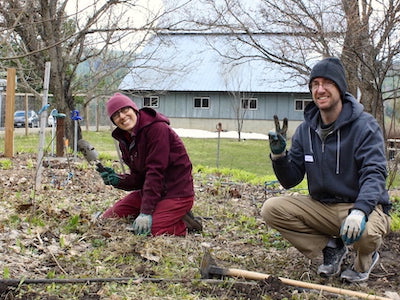Invasive weeds of the mind

It’s no secret that I love nature, and I love playing with Dharma analogies. One of the best Dharma analogies that I like to play with is that the mind is like a garden that we need to cultivate. And some of the biggest obstacles to growing the fruits and flowers of wisdom and compassion are the weeds of the afflictions.
In Buddhism we talk a lot about the afflictions—disturbing emotions and incorrect views that disturb the tranquility of the mind. But what exactly is a weed? This depends on how you conceive of and designate it.
In the world of ecology, an invasive species can be any kind of living organism—plant, animal, insect, fish, even bacteria—that is not native to an ecosystem and that harms that ecosystem. It causes harm when it grows and spreads aggressively, outcompeting other species, which disrupts the natural diversity and balance in the ecosystem. This is similar to the self-centered thought that quickly proliferates and exaggerates, forgetting the diversity and richness of life, forgetting that we depend on others for our life, our happiness, and our spiritual growth.
Invasive species are spread largely by humans—from transportation on ships and vehicles, by people hiking in different parts of the world, and especially from innocent gardeners wanting to plant pretty flowers—like the yellow flower called salsify or a lovely white flower called oxe daisy, which we have here at the Abbey.
While a few different plant or animal species may not seem like a big deal, 42 percent of threatened or endangered species are at risk of extinction due to invasive species. We can look at our own minds and see that if we let the afflictions run wild, it ruins any chance for cultivating positive mental states and takes us farther away from being peaceful and happy.
There are many different kinds of invasive species, and the term “noxious weed” is used to categorize different species into a top “wanted or most harmful” list. Similarly, we know that anger, attachment, and ignorance are the biggest afflictions in our minds. Although most of us at the Abbey have learned to identify the noxious weeds knapweed, St. John’s wort, and mullein, there are many other non-native invasive species that if not subdued can quickly take over. Similarly, there are many afflictions such as comparing ourselves to others, competition, and arrogance that can seem subtle and unimportant but can sneak up and completely obscure our minds.
This is why the qualities of mindfulness and introspective awareness that we work on developing in meditation are so important. We train to pay attention to when the mind gets a little bit obsessive and a little bit hyper-focused on just one thing, repeating the same thoughts or stories over and over again, forgetting to have a larger perspective and survey the landscape of the mind from a broader view, really looking at the overall pattern of thoughts, seeing what the trend of thoughts and emotions is and if it is in balance with the reality of what is going on in front of us.
Around the drain field, lots of ugly invasive plants are starting to take over that I haven’t identified yet. But I know they are invasive because they have a ton of spiky, sticky seeds and are spreading quickly. There is a saying in the world of invasive species management: “early detection, rapid response.” Unless we are vigilant, it will be too late to easily prevent their proliferation, like we are seeing with the bulbous blue grass, plantain, and that beautiful purple pea flower called bird vetch. Similarly, we want to catch the afflictions when they are small, for example noticing the first hint of irritation or exaggerated clinging. If we can catch one judgmental thought toward someone and turn it around with a moment of appreciation for their efforts, we’ve saved ourselves a lot of suffering in the future. It’s just like one single knapweed plant that can produce 25,000 seeds and spread knapweed like wildfire. If we notice it and pull it out now, we save ourselves a lot of work in the future. Similarly, If we can remember that one negative thought can grow and produce 25,000 negative thoughts, we will want to be very careful and not let it spread. Once an afflictive thought or disturbing emotion is cultivated again and again, it can seem nearly impossible to combat and eradicate it.
An important point to keep in mind when working with invasive weeds or the afflictions is to not just focus on removing the “target enemy” but on also replacing it with what is desirable. This means planting the native flowers that will help enhance the ecosystem, just as we rejoice in our own and others’ virtuous qualities and deeds. Let’s nourish the seeds of kindness and compassion and take delight in all the goodness that surrounds us. This is important to do on a daily basis, because we have such a strong habit of focusing on the negative. It’s like feeding the weed seeds when we need to put extra effort into watering the seeds of appreciation and gratitude.
Another way to work with the afflictions and invasive weeds is to see their faults. We can easily think that attachment is a good thing, that the pretty pink and purple perennial pea vine is nice and attractive. But soon we have become so strangled and tangled in it that when the flowers fade all we are left with is a big mess and a lot of seeds of negativity in our mind—and these seeds prompt the same afflictions to arise in our minds again. It’s like setting our mind up to habitually chase after some external pleasure, exaggerate its good qualities, and develop all sorts of unrealistic expectations about how it should always bring us pleasure.
Correct understanding is important. Not all plants that have been designated “weeds” or have the word “weed” in them are horrible; some can in fact be nutritious food. We just have to learn to identify what actually causes harm and what is beneficial, which isn’t always easy to do. For example, speaking up with confidence can be beneficial and important, but speaking up out of arrogance or the wish to control can be harmful. It’s the same action, but it is caused by a different motivation and brings a different result.
Milk weed, fire weed, and sneeze weed are important native plants in one place, but when put into different environments are harmful. It can be hard to know what exactly is a weed. Similarly, wisdom and understanding are required to know what the results of our thoughts and actions will be. We must observe our body, speech, and mind closely and pay attention to what actually causes harm and what creates benefit. We need to discern which thoughts and actions create a healthy balance in our lives, even though this balance is always shifting and changing.
As we work on cultivating a flourishing garden on our land and in our minds, let’s use nature as a teacher to show us how to work on growing a balanced mind that is supportive for all the diversity of life. As we work on developing a sustainable mind, we are also helping to collectively make a sustainable world.
Watch Venerable Dekyi’s talk here:
Venerable Thubten Dekyi
Venerable Thubten Dekyi grew up in Olympia, WA and earned a Bachelor of Science degree in Natural Resource Management and Wildlife Ecology from Washington State University. She has been interested in Buddhism since she was 16 but never had a teacher or Dharma center until 2006. While living in Sandpoint, ID, she saw a flier that a Buddhist nun, Venerable Thubten Chodron, was teaching nearby in Newport, WA. Being greatly inspired by Venerable Chodron and the residents at Sravasti Abbey, the future Ven. Dekyi attended retreats and offered service while continuing to live less than an hour away in Sandpoint. Wanting to do something more with life than be a ski bum and seasonal wildlife technician, she served in the Peace Corps in Ethiopia from 2012 to 2014. To pay off student loans and to fulfill her dream of becoming a Wildlife Biologist, she then worked for the US Forest Service in Newport, Oregon. This was a funny twist of coincidence since deep down she knew she wanted to live at Sravasti Abbey. After joining in a one-month Vajrasattva retreat at the Abbey in 2019, she decided to take the leap and move to the Abbey, which she did in October 2019. She trained as an anagarika for 11 months, and then received novice ordination on October 7, 2020.


